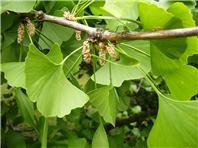Gingko biloba extracts are frequently mentioned across the various herbal/alternative medicine sites. Indeed, I have been tempted to try it myself for a non-thyroid reason. So any concern over its safety has to considered carefully.
This paper comes from a reputable source and suggests the very serious possibility that extracts of Gingko biloba actually cause cancer of the thyroid and liver in mice and rats.
Far from proof that it does the same in humans, but enough of a red flag to raise concerns.
NTP TECHNICAL REPORT ON THE TOXICOLOGY AND CARCINOGENESIS STUDIES OF GINKGO BILOBA EXTRACT (CAS NO. 90045 - 36 - 6) IN F344/N RATS AND B6C3F1/N MICE (GAVAGE STUDIES)
NATIONAL TOXICOLOGY PROGRAM
March 2013
NTP TR 578 NIH Publication No. 13 - 5920
National Institutes of Health
Public Health Service
U.S. DEPARTMENT OF HEALTH AND HUMAN SERVICES
Background
Extracts from leaves of the Ginkgo biloba tree are used as an herbal remedy and dietary supplement purported to improve memory and brain function. We studied the effects of ginkgo biloba extract on rats and mice to identify potential toxic or cancer-related hazards.
Methods
We deposited solutions containing Ginkgo biloba extract in corn oil through a tube directly into the stomach of male and female rats and mice five times a week for two years. Groups of 50 male and female rats received 100, 300, or 1,000 milligrams of Ginkgo biloba extract per kilogram of body weight, and groups of male or female mice received 200, 600, or 2,000 mg/kg each day. Similar groups of animals were given solutions of corn oil with no chemical added and served as the control groups. At the end of the studies, tissues from more than 40 sites were examined for every animal.
Results
Every group of animals exposed to Ginkgo biloba extract experienced increased rates of a variety of lesions in the liver, thyroid gland, and nose, and male and female mice also experienced several different lesions in the forestomach. These lesions included hypertrophy in the liver and thyroid gland in rats and mice, liver hyperplasia in male and female rats, hyperplasia and atrophy of the epithelium within the nose of male and female rats, and inflammation, hyperplasia, hyperkeratosis, and ulcer in the forestomach of male and female mice. In addition, increased incidences of cancers of the thyroid gland were seen in male and female rats and male mice and liver cancers in male and female mice.
Conclusions
We conclude that Ginkgo biloba extract caused cancers of the thyroid gland in male and female rats and male mice and cancers of the liver in male and female mice.
ntp.niehs.nih.gov/ntp/htdoc...
Rod
Picture is of a Gingko biloba

